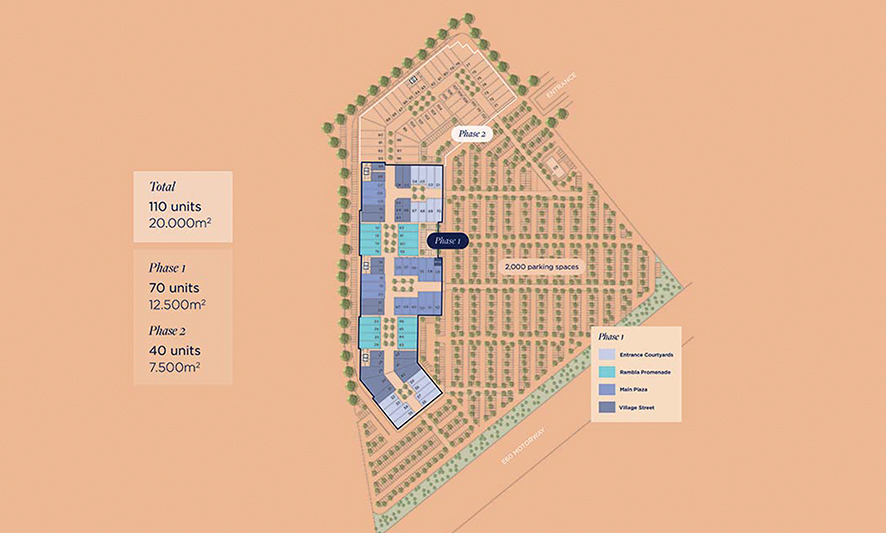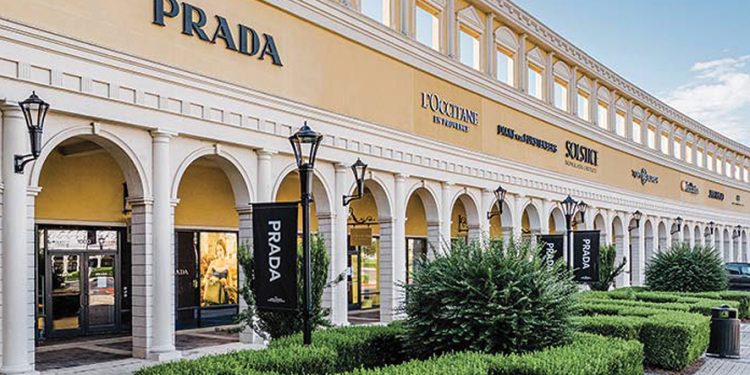By Sally White for Investor.ge
Tbilisi is soon going to gain the latest in “retail-tainment” in the form of the Tbilisi Outlet Village, designed to be luxury shopping heaven to those addicted, and to appeal to both locals and the increasing number of tourists. This will be a 20,000 sq. meter project, opened in two stages, comprising 110 selected retailers of international brands and restaurants.
“Retail-tainment” is booming in Georgia. Not a word you’ve heard before? It is marketing industry jargon for a 21st century gloss on that millennia old activity – shopping. This, say gurus such as international consultants PwC, is “shopping as entertainment” and as a leisure destination – the retail environment that is to be found in markets, shopping malls, department stores, well-choreographed High Streets, festivals, and events. Outlet malls are the latest such development, aiming at the luxury end of the retail market, and Tbilisi is about to get Georgia’s first!
In his book Enchanting a Disenchanted World: Revolutionizing the Means of Consumption, Professor of Sociology at the University of Maryland George Ritzer describes “retailtainment” as the “use of ambience, emotion, sound and activity to get the jaded consumer interested in the merchandise on offer and in a mood to buy.” Outlet malls, with their combination of a selection of cut-price top-of-the range brands, gourmet food offerings, and attractive architecture and amenities, are typical.
Outlet stores began in the US in the 1930s with the purpose of shifting old inventory that was not moving. Come 2024, developers have clustered them into malls and “especially post pandemic, when inflation skyrocketed and supply chain crises disrupted the flow of goods, luxury brands, including established and emerging ones,” says Forbes US. Now, retailers “are giving outlets a place in the luxury distribution ecosystem.” The reason, says Stephen Yalof, CEO of one of the US’s largest premium outlet mall groups Tanger Outlets, that “the single biggest advantage of luxe brands opening outlets is that they can control the customer relationship, prices, and the brand’s upscale positioning – unlike other liquidation platforms.”
Consumers like the pleasure of a luxury purchase without the pain of paying full price. US analytical group Place.ai reports that outlet malls in the US “appeal most to young couples on their way up in terms of income,” in particular Gen-Z adults. Since 2021, US luxury outlet sales have gained 35%, or around $386 billion. In Europe, with a lot of luxury brands having a tough time, reflecting the state of the economy and struggles with significant debt and too much inventory, 2023 saw some record price cuts and strong interest in outlet channels.
Tbilisi’s first outlet mall
By summer’s end, Georgia is going to get its first outlet mall – Tbilisi Outlet Village, designed to be a luxury shopping haven. The 20,000 square meter project, which will open in two stages, will offer shoppers their choice of more than 110 selected retailers of international brands and restaurants. It is designed as a village of low-lying traditional lanes, squares and courtyards, with heritage facades, a main plaza, and trees that will provide shade.
The plan is to start with Phase 1 of 12,500 square meters, containing 70 units. The second phase will come later, as will the opportunity to augment the retail offering with online sales. Parking space will be available for 2,000 cars. It has been three years in the building and is now on schedule to open in early September. Drivers on the E60 Tbilisi by-pass road have been able to observe the rising profile on the landscape of the complex. Given the location, near to the Tbilisi airport and not far from Azerbaijan, Armenia, and Russia, visitors have been forecasted to top 7 million within the first three years.
Partners in the project are the well-established Georgian entrepreneur Guram Tsanava’s Georgian Outlets & Resort Group (GORG), construction company Domus, and US-based international outlet consultants TORG (a network of experts operating as The Outlet Resource Group). Around 70% of the targeted brand pre-lease contracts were signed last year, including over 15 brands not yet officially represented in Georgia.
TORG says the brands in the outlet mall will include Armani, Chanel, Dior, Gucci, Dolce & Gabbana, Elisabetta Franchi, Elena Miro, Iceberg, American Vintage, Liu Jo, Canali, Baldessarini, Brioni, Boggi, and Corneliani. From sports ranges there will be Adidas, Nike, and Puma, along with New Balance, Kappa, Levi’s, Diesel, Wrangler, Mavi, and Calvin Klein Jeans.
Persuading tourists to spend more will be particularly important for the economy, given Georgia’s increased focus on promoting high-value tourism in recent years. Retail is, according to the World Travel and Tourism Council’s (WTTC) latest annual report, “the driving force behind the (post-Covid) recovery of the Travel & Tourism Sector, contributing significantly to revenue, job creation, and overall economic growth.”
While High Street shops “remain popular destinations,” says the Global Retail Trends and Insights report from the WTTC, the Hospitality & Tourist Center of Hong Kong Polytechnic University, and the Bicester Collection, “out of town retail is growing in popularity.” In Georgia, tourist surveys show that shopping opportunities are a major reason that Tbilisi is able to draw so many visitors from neighboring countries. Shopping, according to commercial real estate agents Cushman & Wakefield, can make up to 23% of tourists’ spend.

Retail revenue and trends
Spending by local Georgian shoppers and tourists overall on such popular buys as clothing and accessories has been robust so far this year, as indicated by figures collected for TBC Capital’s Consumer Spending Tracker. In March, 15% annual growth was registered in non-cash spending through TBC channels on apparel and accessories, just slightly more than in February.
The last few months have already brought additions to the Tbilisi retail scene. One in particular noted by the region’s upmarket and retail media is the expansion by the Avsajanishvili family of its St. Petersburg empire, with the opening of a luxury multi-brand Boygar’s store at a location on Rustaveli near the Tbilisi Marriott. The store targets a premium niche in the luxury line of clothing, fashion accessories, and jewelry. Estate agents say that demand for shop space has been high.
Retailers have been drawn to Georgia by the strength of the economy, robust consumer spending, and rising tourist numbers. The economy has been forecast to grow by around 5% this year, inflation at a rate of 1%, and tourism to expand by around 20%. In Q1 of 2024, tourists numbered 1.2 million, and the overall growth in their receipts compared to pre-pandemic levels was 40%, according to TBC Capital analysts. Their credit card spending through TBC systems in retail stores was also up around 11%. Total spend (including hotels) by international visitors in 2022 was $3.5 billion, and, of course, it is now considerably more.
Retail is one of the pivotal sectors in the Georgian economy, comments Georgian international development consultancy PMCG in its report on The Retail Trade Sector. It pulled in around 90 billion GEL between 2018-2022, and has constituted 14% of the total business sector turnover. It is also one of the most significant sources of jobs, employing on average around 16% of the total employees in the business sector, or over 116,000 people, and is a leader in terms of tax revenue – GEL 3.6 billion between 2021 and 2022. The profit margin enjoyed by Georgia’s 12 largest retailers is, says PMCG, a very healthy number – just over 21%.
Georgia’s retail sector currently has around 24 shopping centers of various types – from malls to community centers, according to Cushman & Wakefield, blending local and international brands and occupying in total around 541,000 of gross leasable space. Tbilisi, says the commercial real estate agent, is “witnessing a gradual increase in high-class and luxury brands.” In recent years, it states in its 2023 report, “shopping centers have been the preferred choice for shoppers, although since 2022, there has been a resurgence of interest in street retail, fueled by an uptick in visitors and tourism.” However, mall projects are now “set to expand the Tbilisi market,” and “the addition of 72,000 square meters of leasable area after 2025” indicates a market poised to grow.
Demand for retail space also enabled owners to increase Tbilisi rental prices by 11% last year, bringing them almost back to pre-Covid levels, according to TBC Capital in its latest look at the retail sector. The Georgian analysts expect Tbilisi street rentals to rise a further 8% in 2024. Shopping mall rentals rose by 7.5% in 2023, and here the TBC rental increase forecast is for 5%. Vacancy rates have been shrinking.
Average vacancy rate in Tbilisi shopping malls stood at 7.4% in 2023, a 2.9 pp improvement year on year, according to TBC. “However, vacancies varied significantly by malls, reaching 35% in some of them. Looking ahead to 2024, we anticipate even greater activity in Tbilisi shopping malls and the average vacancy rate is projected to decrease further, accompanied by increased rent prices.”
While the latest income figures for the Georgian shopping malls are not available, Commersant last year published Balkans financial group Finspot figures on Georgia, indicating that in 2021, Tbilisi’s East Point earned the highest income at GEL 32.4 million, followed by Galleria Tbilisi with GEL 26.9 million, and Tbilisi Mall with GEL 21.3 million. East Point’s total revenue in 2021 was 29% higher than in 2020 and only 3% lower than in pre-pandemic 2019.
A comment on the local retail scene from Guram Tsanava, who was the founding partner of GORG, is: “Many luxury brands have entered Georgia in the past year in beautiful flagship stores, or as part of new high-end shopping locations. This makes us very optimistic looking at the future of Tbilisi Outlet Village.”
By Sally White for Investor.ge














